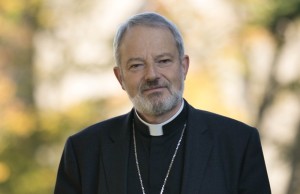
By Sarah Mac Donald - 24 February, 2016

Bishop Kevin Doran, bishop of Elphin
As the countdown to the general election enters its last days, the Bishop of Elphin has again flagged up areas Catholic voters need to be concerned about, namely respect for human life, the family and education, healthcare and religious freedom.
In his address on Tuesday evening in Sligo, ‘How should a Catholic think about politics?’, Bishop Kevin Doran defended the right to life of all human beings including unborn children diagnosed with life limiting conditions.
His talk was hosted by the Iona Institute.
The Bishop told those gathered in the Clarion Hotel that in 2013, the Government passed legislation which permitted direct abortion in certain circumstances.
He said that nearly four years after the tragic death of Savita Halappanaver in October 2012, the deputy leader of that Government was still promoting the idea that the 8th Amendment was responsible for her death.
“The truth, presented in official reports is quite different. Savita died because of ‘a failure in the provision of the most basic elements of patient care’,” Dr Doran stated.
Elsewhere, he said that when people take to themselves the right to decide when another human being lives or dies, “we call into question the fundamental right to life for each and every person”.
He said this is why the Constitutional declaration of the right to life of the unborn, together with the equal right to life of the mother is so appropriate.
“If we deny that right to one category of human beings today, the logic is that we could deny it to other categories tomorrow.”
He added, “This, of course, is where the lie makes its appearance. We try to convince ourselves that some human beings are not as human as others or, as the Supreme Court did in 1992, we convince ourselves that though the right to life of the unborn is equal to that of the mother, the right to life of the mother ‘carries more weight’.”
The Bishop of Elphin also highlighted that some women have asked him if there is anything wrong with aborting babies if they are dead.
He suggested that this was due to the fact that the talk of removing the right to life of the unborn from the Constitution tends to focus on babies with life-limiting conditions and, in the public debate, much of what is presented as fact is “quite misleading”.
“Women have asked me, quite seriously, what is wrong with aborting these babies if they are dead. The truth of course is that they are not dead; they are just spoken of as if they were.”
He underlined that these children may have a much shorter life expectancy than most of us but they are living human beings.
“While they are seriously ill, some of them will live to complete primary school. Their sickness or death, of course, is a cause of great sadness for their parents but, in their short lives, they can also be the focus of great love.”
“For a Christian, there is no such thing as a life without value. For as long as they live, children with life-limiting conditions are entitled to be loved and cared for like any other child.”
He said the focus of government policy should be the provision of peri-natal hospice services to support parents in caring for their seriously ill children.
On the calls for a referendum to repeal the 8th Amendment, he asked why would any civilised society want to remove the protection of unborn children from the Constitution.
“We need to convince our politicians of the importance of supporting and promoting a culture of life that recognises the unique value of every human person, and we need to actively support those who do.”
He reiterated his comment that he found it very difficult to see how any Catholic could, in good conscience, vote for a candidate or a political party whose policy it is to legalise abortion.
On the issue of religious freedom, Dr Doran said there is a “need to protect the space for faith values and faith-based social action.”
“Christian communities and organisations have a long tradition of being present where society is broken”, but there is a “growing concern that this valuable perspective and experience is being marginalised and devalued, because of political opposition to our values in key areas such as marriage, health and education.”
Bishop Doran said that faith-based organisations are facing huge demand for their services but are “seeing their public funding come under threat as a result of equality legislation that does not recognise the right to protect religious ethos.”
If this right is not recognised, he warned, “many Christian organisations, deprived of public funding, may no longer be in a position to offer support to some of the most vulnerable members of our society”.